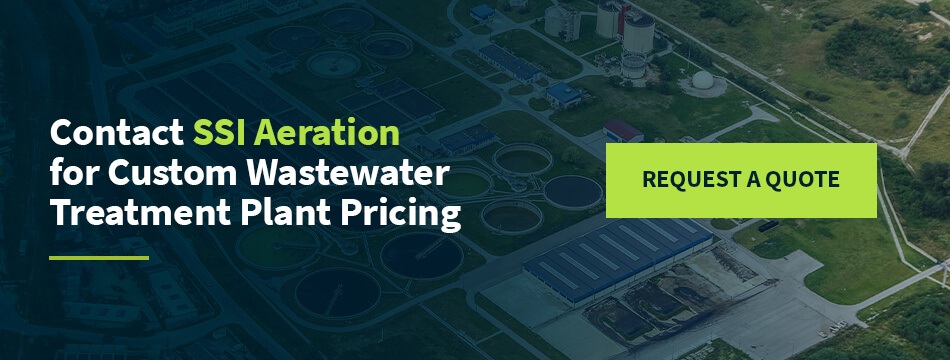How Much Does a Wastewater Treatment System Cost?
By: Tom Frankel
Post Date: noviembre 10th 2021
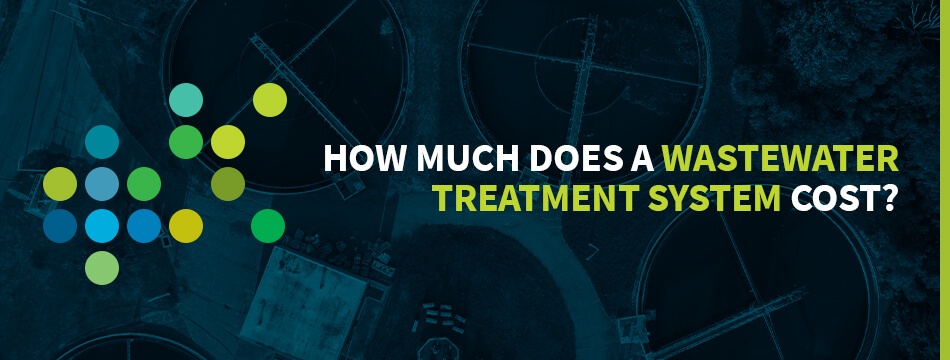
Wastewater treatment is important for many different reasons. It helps preserve the environment, protect human health and alleviate water scarcity. Although a wastewater treatment plant is an initial and continuing investment, it’s a necessity. An accurate wastewater treatment plant cost estimate depends on various factors, such as the water’s pollutants, system equipment, labor and long-term maintenance. Expenses vary by system type and industry.
Learn how much it costs to build a water treatment plant and maintain it for years to come.
Table Of Contents
- Parts of a Wastewater Treatment System
- Planning a Wastewater Management Project
- Why Is Wastewater Management So Expensive? Important Factors to Consider
- Increased vs. Decreased System Automation
- How Long Does It Take to Build a Water Treatment Plant?
- How Expensive Is the Process of Filtering?
- Average Cost of a Wastewater Treatment Plant
- Contact SSI Aeration, Inc. for Custom Wastewater Treatment Plant Pricing
Parts of a Wastewater Treatment System
Wastewater treatment systems contain several parts, each vital for efficient operation. It’s important to understand each part of a wastewater treatment system before planning and constructing one.
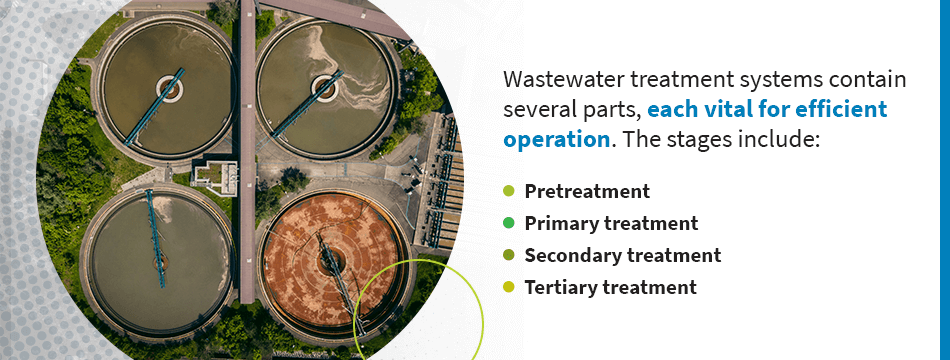
The stages include:
- Pretreatment: The first part of water filtration is pretreatment, which involves removing large solid particles from the wastewater. Solid particles include everything from tree limbs to coffee grounds. The total wastewater treatment costs per gallon will depend on how many particles contaminate the water before treatment.
- Primary treatment: The primary treatment part of the process addresses other notable pollutants. Several different methods are available for primary treatment — the best choice depends on the pollutants at hand and the goals for cleanliness.
- Secondary treatment: The secondary treatment addresses further impurities. In this stage, microorganisms further break down pollutants remaining in the wastewater. This stage can be either anoxic, anaerobic or aerobic, which determines whether or not oxygen molecules are present.
- Tertiary treatment: The final stage is tertiary treatment, which involves extra filtration. High-stakes industries, such as pharmaceuticals or food manufacturing, often implement tertiary treatments. Other industries may not need this step.
Planning a Wastewater Management Project
Early in the planning stage, it’s best to understand all industry standards and regulations thoroughly. Doing so allows for fundamental decision-making, such as determining target purity. Industry standards may be complex when involving high-pollutant wastewater or high purity effluent standards.
Consider these crucial planning elements:
- Choosing a building site: Choosing the proper site requires careful consideration and knowledge of restrictions and requirements. A consulting service is often necessary for site placement. It’s vital to choose an adequate geographical area and determine a well-defined scope. The limitations and unique factors related to selecting a building site will influence costs. A proper building site ensures efficiency, safety and cost-effectiveness. The site must be large enough for effluent transport, as well as sludge or other waste disposals. The site location should also serve to minimize environmental impacts.
- Obtaining all federal, state and local permits: The planning stage includes applying for all relevant building permits, which are necessary before construction can begin. Obtaining permits ensures compliance with legal standards, which protect health and safety while minimizing environmental impacts. In most cases, an environmental impact study will be part of the permit process.
- Determining to fund: The planning stage is also the time for determining funding sources. If grants are available, applications should include all necessary information and descriptions. Grant applications must include an explanation of why facility construction is necessary.
- Engineering and design: Planning requires engineers with expertise in various areas, such as civil, mechanical, and electrical construction. A team of professionals will use the client’s goals and limitations to create a construction plan.
- Reviewing the plan: Once a plan is in place, governing bodies must review and approve it. Such entities will expect to see a description of the proposed plan’s scope, construction schedule, and costs. The plan must include an area map with geographic features and political jurisdictions outlined. It should consist of any relevant demographic information and statistics on current water quality and environmental conditions.
Why Is Wastewater Management So Expensive? Important Factors to Consider
Both residential and industrial water treatment can be expensive. Treatment systems utilize advanced technology, often involving large equipment in multistage facilities. Many different factors influence the cost of a wastewater treatment system, including the following:
1. Quality of Effluent
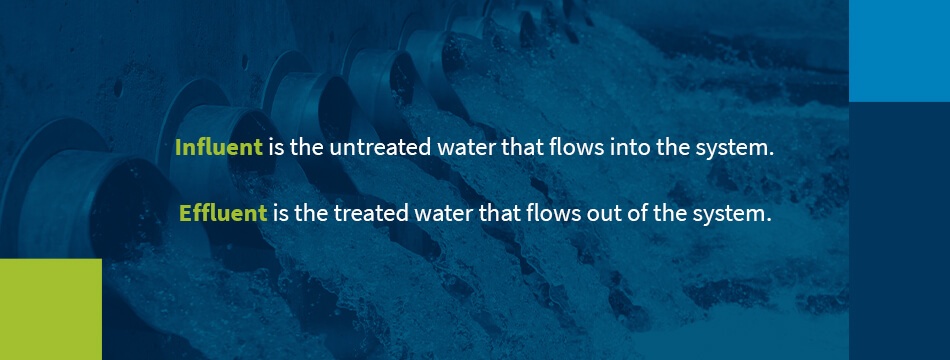
The quality of the effluent is one-factor influencing wastewater treatment system cost. The terms “influent” and “affluent” both describe moving water — influent is the untreated water that flows into the system, and effluent is the treated water that flows out of the system. The effluent must meet regulatory standards, which vary by industry and wastewater type. Standards help to reduce global pollution, preserving ecosystems and human health.
Pollution types, as outlined in the Clean Water Act, may be either conventional or toxic. Examples of conventional pollutants include total suspended solids, fecal coliform, and oil or grease, while examples of toxic pollutants include benzene, chloroform, mercury, and lead — materials that pose serious health and safety risks.
Effluent treatment plant costs depend on the nature of the wastewater and the standards for its treatment. Standards vary by industry, influencing costs. For instance, the cement manufacturing industry produces controlled pollutants such as total suspended solids (TSS), temperature, and pH. The effluent treatment plant must address these pollutants.
2. Flow Rates
The water flow rate is another concern affecting system costs. Flow rates can be higher or lower depending on water use and activity. For instance, domestic municipalities tend to experience higher sewage flow rates in the morning and evening when more people are at home and using appliances. With higher than average flow rates, wastewater treatment expenses will be greater.
3. Target Purity
Another factor affecting cost is the treated wastewater’s targeted purity level. In some cases, compliance with industry standards may be necessary. For instance, a pharmaceutical wastewater treatment plant must meet designated regulations, which vary by manufactured product. It’s vital to understand the contaminant threshold permitted for the specific application.
Higher purity standards increase the cost of a wastewater treatment plant. Choosing the right technology can increase efficiency and mitigate long-term operating costs. Even still, high purity targets raise costs. Purity targets depend on industry, location, function and other factors.
4. Construction Materials
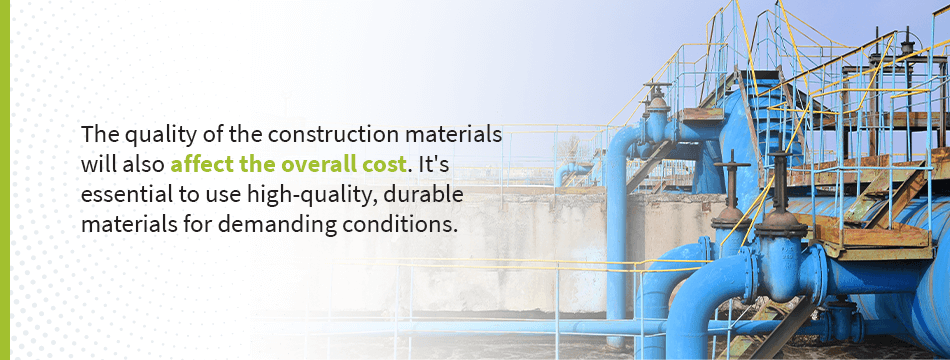
The quality of the construction materials will also affect the overall cost. It’s essential to use high-quality, durable materials for demanding conditions. For instance, high flow rates, extreme temperatures, and a high concentration of damaging chemicals call for the best possible materials. Less demanding applications might perform well with inexpensive materials, such as polyvinyl chloride (PVC) pipes rather than stainless steel pipes.
While the upfront cost may be greater, using better-quality equipment helps to minimize future maintenance, repair and replacement costs. If wastewater has a high flow, a corrosive or hard makeup or an extreme temperature, it’s best to choose durable construction materials. On the other hand, there’s no need to pay extra for unnecessary high-quality equipment. If the wastewater poses little difficulty, simpler construction materials will help reduce the overall cost.
5. Planning Costs
Initial planning factors into the cost to build a wastewater treatment plant. The planning phase includes reviewing all regulatory requirements, site-specific challenges and objectives. Engineering costs are mechanical, electrical and civil. The rate of these expenses depends on the project’s unique obstacles and goals. The level of difficulty in the planning phase will correspond with its costs. For instance, installing a prepackaged system will simplify planning and reduce relevant expenses.
6. Space Requirements
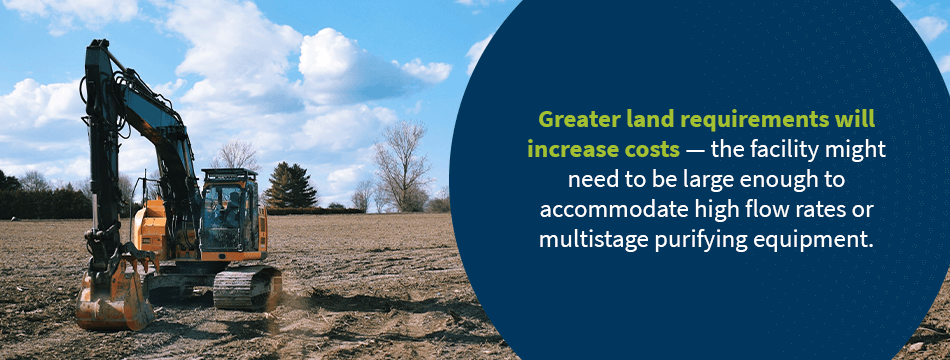
Another element of wastewater treatment cost estimation is the space requirement. Facility size and location influence costs. For instance, purchasing the necessary land for the facility is more expensive in some regions than in others due to local real estate rates. Greater land requirements will increase costs — the facility might need to be large enough to accommodate high flow rates or multistage purifying equipment. It can be helpful to invest in space-efficient technology solutions.
7. Installation
Installation-related expenses contribute to the treatment plant cost. Professional installation is a necessary expense, as trying to install equipment without professional guidance is not advisable. Installation technicians ensure the best possible equipment performance. When choosing an installation team, look for all relevant certifications, liability insurance, equipment familiarity and experience.
8. System Automation
The level of system automation affects the cost of water treatment plant construction and operation. A high level of automation decreases operator intervention, while a lower level of automation increases reliance on operators. Each option has unique advantages and disadvantages. The right choice depends on relevant circumstances.
9. Prepackaged Systems
A prepackaged or “turnkey” system might be available for certain applications. Prepackaged systems offer advantages. They tend to cost less, reducing construction time by several months or even years, depending on site size and complexity. Since they simplify the planning process, prepackaged systems decrease planning and construction expenses, whereas build-in-place construction can result in increased expenses. In that way, package wastewater treatment plant costs may be less than customized plant costs.
A turnkey solution isn’t the right choice for every application. Customized wastewater treatment facilities often improve efficiency, fit better with precise specifications and ensure compliance with industry standards. While build-in-place options may lengthen the planning and installation phase, they could improve long-term operation.
10. System Shipment
Whether you opt for a prepackaged or customized system, shipping costs will influence the final price. It’s possible to reduce shipping costs with strategic timing. Freight expenses vary depending on several factors, such as:
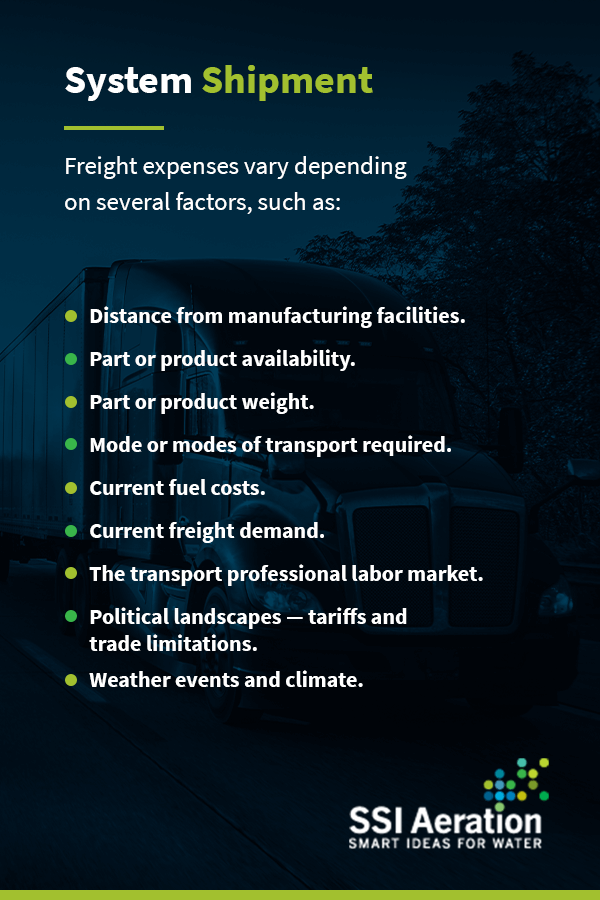
- Distance from manufacturing facilities.
- Part or product availability.
- Part or product weight.
- Mode or modes of transport required.
- Current fuel costs.
- Current freight demand.
- The transport professional labor market.
- Political landscapes — tariffs and trade limitations.
- Weather events and climate.
Timing a purchase for lower freight rates can decrease total costs. For instance, it may be wise to wait for periods of low freight demand before placing an order. Such decisions should be part of the planning process.
11. Regulatory Costs
Regulation requirements — which vary by industry, location, and wastewater content — impact costs. It’s vital to meet all regulation standards, including permits, approvals, and restrictions. Doing so prevents expensive and reputation-damaging compliance failures.
Regulatory costs might include:
- Obtaining permits: Getting all necessary permits to meet regulations can incur expenses. Consulting services might be necessary during the permit request process, such as environmental consulting to perform environmental impact studies.
- Staying within discharge limits: Facilities are subject to strict discharge limits, which the National Pollutant Discharge Elimination System (NPDES) oversees. It’s essential to stay within discharge limits to avoid breaching regulations and incurring fines or other legal action. Making sure a facility does not exceed discharge limits is a necessary expense.
- Preparing for monitoring and reporting: Monitoring and reporting boost accountability and ensure regulatory compliance. The NPDES performs on-site compliance inspections and creates monitoring reports. It’s a good idea to review the NPDES Compliance Inspection Manual before inspections. Facility managers should set aside time and resources to ensure compliance, increasing costs.
- Taking special measures: Regulations might necessitate special measures. To protect the environment, for instance, advanced wastewater treatment technologies might be required.
Although complying with regulations may increase an industrial water treatment system cost, it’s a fundamental part of the process. Understanding and adhering to regulations allow manufacturers and municipalities to protect their local environments, preserve human safety and reduce the risk of non-compliance costs and damages.
12. Waste Disposal Costs
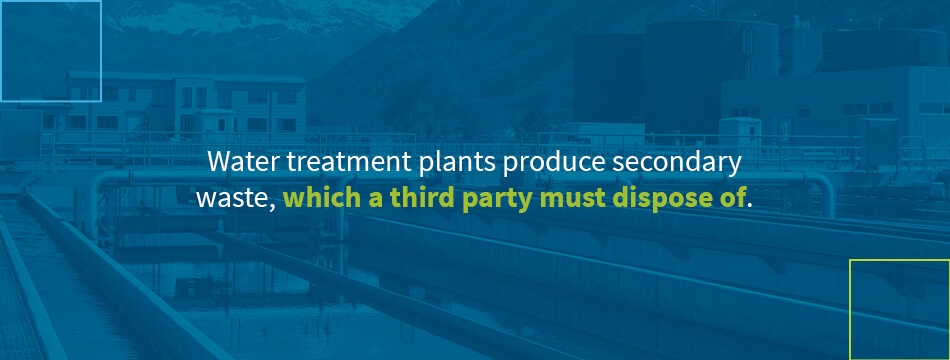
Water treatment plants produce secondary waste, which a third party must dispose of. Secondary waste disposal is another cost to consider. It may be possible to reduce secondary waste with better water treatment technology, but some secondary waste is inevitable. The process for disposal preparation might include:
- Solidification.
- Further filtering.
- Evaporation.
- Secure storage.
13. Operational Costs
Operational costs are complicated, involving many different factors. In addition to a wastewater treatment plant construction cost estimate, it’s best to determine an operational cost estimate for the duration of the system’s lifespan. Some elements influencing operational costs include:
- Flow rates.
- Water purity objectives.
- Changing regulations.
- Maintaining automation systems or operational staff.
- Keeping up with regular system maintenance.
- Replacing parts when necessary.
- Preparing for inspections.
- Disposing of secondary waste.
It’s possible to reduce operational costs by improving system efficiency. Several measures can increase system efficiencies, such as equipment upgrades, more precise calibration and smarter monitoring technology. For instance, using aeration techniques can make wastewater treatment faster and more efficient.
14. Wastewater Maintenance Costs
Wastewater treatment equipment maintenance is another cost to factor in. Keeping up with preventive maintenance can help minimize the risk of damage repair and unexpected downtime. Such tasks should include:
- Routine equipment instructions.
- Control panel adjustments.
- Equipment training reviews.
- Lubrication and part replacement, as necessary.
- Preemptive purchase of spare parts.
Increased vs. Decreased System Automation
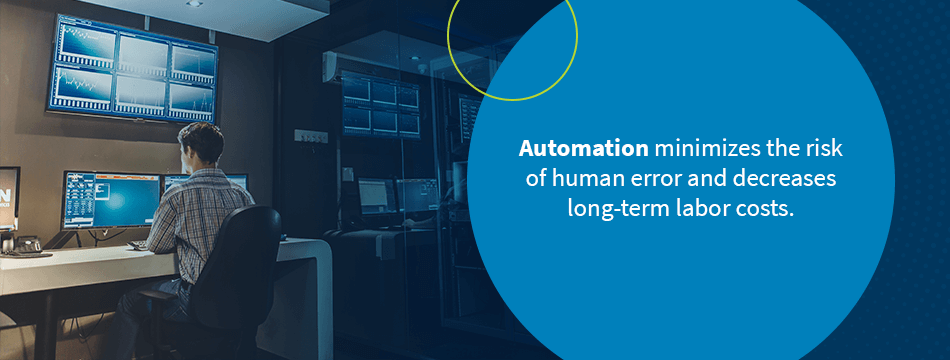
An increased level of automation serves several purposes. It minimizes the risk of human error and decreases long-term labor costs. High automation may reduce the lifetime operating costs of a wastewater treatment system. Automated equipment and features tend to be more expensive than their manual counterparts. Initial expenses might be greater.
An example of an automation feature is a programmable logic controller (PLC). A PLC is an industrial computer control system with advanced monitoring capabilities, evaluating various inputs to make decisions. PLCs have useful applications in assembly lines, machines and robotics. They’re highly versatile, flexible and efficient, handling complicated logic operations, and the technology continues to evolve and improve. Including a PLC panel in a wastewater treatment plant will raise the initial costs. In instances of simple wastewater treatment, a PLC may be a superfluous investment.
The alternative is to minimize automation and rely on manual operations. If water treatment needs are uncomplicated and consistent, depending on manual operation may be the more cost-effective approach. Keep in mind, labor is a long-term, increasing investment, and staff availability varies. Though manual controls incur decreased upfront costs, they could end up raising the lifetime operating cost of a wastewater treatment plant.
Consider how complicated operations will be, and the impact human error may have. If treatment needs are complex or the stakes of an error are high, greater automation could be the best choice. If operation will be simple and mistakes unlikely, decreased automation is possible. Decreased automation means lower upfront costs.
How Long Does It Take to Build a Water Treatment Plant?
Keep in mind, the construction or installation period can take weeks, months or even years, depending on the scope and complexity. The installation timeframe is an important factor to consider, as longer timeframes incur greater costs.
How Expensive Is the Process of Filtering?
Once a system is installed, filtering costs vary. In many cases, systems with high initial values offer favorable upkeep costs. For instance, inexpensive systems may require more frequent filter changes for adequate function. Consider the long-term filtering costs of your chosen wastewater treatment system type.
Average Cost of a Wastewater Treatment Plant
Wastewater treatment plant costs vary by system type, industry, location and other factors. When determining a price estimate, consider these factors and the impact they might have.
Average Cost by System
Choosing the right system type for a specific application can help to reduce costs. Each system type serves different purposes. Here are some popular wastewater treatment systems and their average costs:
- CAS: A classical activated sludge (CAS) system uses an aerobic tank to biodegrade organic material. This may be only part of the purification process. The cost per cubic meter is about $0.20, which makes it an economical choice.
- ASP: An activated sludge process (ASP) treatment plant is similar to a CAS plant. ASP uses oxygen to encourage microbial digestion of pollutants. It’s a common treatment method for sewage, not usually more expensive than CAS.
- IFAS: Newer technology includes integrated fixed-film activated sludge (IFAS). What differentiates an IFAS system is the addition of an attached growth media to the tank. The wastewater treatment cost per m3 for an IFAS system will be greater than that for a CAS or ASP system.
- SBR: A single batch reactor (SBR) performs all necessary functions of purification within one vessel, which helps save on operating costs and reduces system size. Although it can decrease lifetime costs, an SBR system could be a greater initial investment.
- SBBR: A sequencing batch bioreactor (SBBR) speeds up the aeration stage of wastewater treatment. Although it may be relatively expensive, an SBBR can improve overall efficiency and reduce equipment costs.
- MBR: Another option is a membrane bioreactor (MBR). Like any filter, an MBR allows water through but not dissolved materials.
- MBBR: Using free-floating plastics, a moving bed bioreactor (MBBR) allows free-floating plastics to produce attached biofilm growth.
It’s often most helpful to evaluate wastewater treatment cost per cubic meter, as these measurements will be scalable for a project of any scope.
Average Cost by Industry
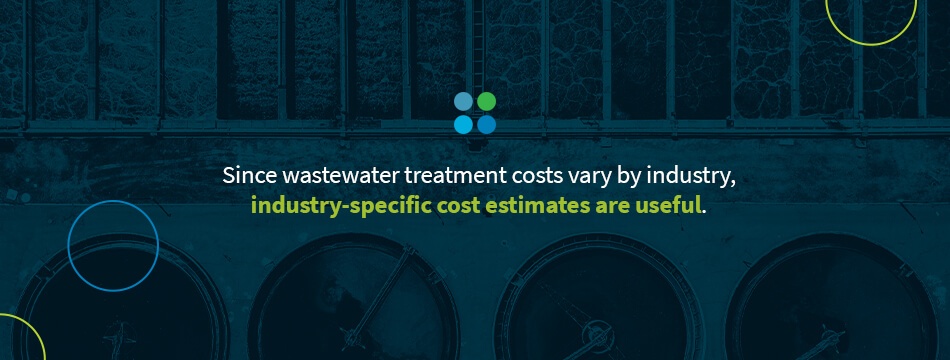
Since wastewater treatment costs vary by industry, industry-specific cost estimates are useful. For instance, chemical manufacturing can produce many water pollutants, some of which are high-priority. The food and beverage industry tends to produce wastewater with high levels of suspended solids. Since each industry results in different wastewater pollutants, wastewater treatment plant cost per million gallons per day (mgd) will vary.
Contact SSI Aeration, Inc. for Custom Wastewater Treatment Plant Pricing
Specialized wastewater treatment is a crucial part of the operation for dozens of industries. The proper treatment protects both the environment and human safety by limiting the pollutants in water sources. Each industry must abide by a unique set of regulations and standards for removing the unique pollutants they produce. These and other factors influence an industrial or residential wastewater treatment plant’s cost.
For accurate custom pricing, contact SSI Aeration, Inc. SSI Aeration, Inc. provides a range of wastewater and sewage treatment plant equipment, including bubble diffusers and efficient aeration systems. Each product uses state-of-the-art technology at competitive prices. Learn more about wastewater treatment equipment and contact SSI Aeration, Inc for custom wastewater treatment plant pricing.

Mr. Frankel co-founded SSI in 1995 with experience in design and distribution of engineered systems. He is in charge of sales, marketing and operations in the company. Mr. Frankel holds multiple US patents related to diffusers. He is a graduate of Washington University in St. Louis.


